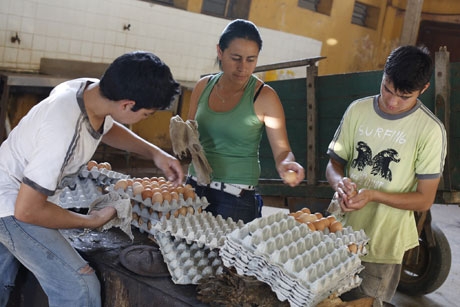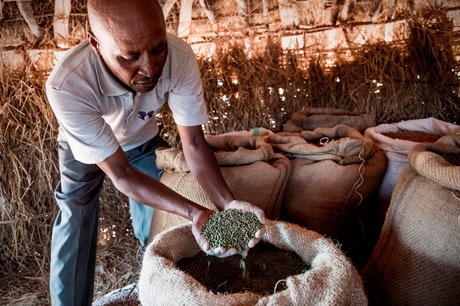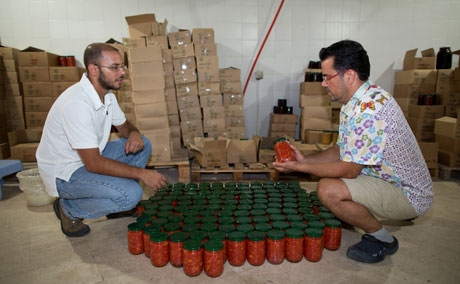Nestlé announces winner of Creating Shared Value Prize

Nestlé awarded the prize to Fundación Paraguaya de Cooperatión y Desarrollo for its ‘agricultural self-sufficient school’ project which ensures students receive technical and business training on top of their normal academic curriculum.
The announcement was made at the Creating Shared Value Forum 2012 in New Delhi, India.
The ‘self-sufficient school’ initiative sets up micro-businesses based on the school premises that teach teenagers the skills employers need.
Each school, together with the non-profit organisation Fundación Paraguaya de Cooperatión y Desarrollo, creates a ‘teaching and production’ business plan to define which small enterprises it will set up.

These micro-businesses range from agricultural technical assistance, milk production, farming, organic gardening, hotel services, bee keeping and chicken egg production.
Teachers also help the students to develop skills to run their own businesses.
Money generated from the enterprises enables the schools to be self-sufficient and cover their operating costs – such as salaries, administration and school maintenance – without the need for government funding.
The project led by Fundación Paraguaya de Cooperatión y Desarrollo has already reached more than 500 students in Paraguay

It was first established in 2003 at the Escuela Agrícola San Francisco. It has been financially self-sufficient for more than five years.
Two other schools in the country are implementing the programme.
Worldwide over 50 schools in 30 countries in Latin America and Africa are replicating the project. This year about 25 schools in Tanzania, Africa, are also developing the model.
The Nestlé Creating Shared Value (CSV) Prize funding will help to scale up the project in Paraguay
The funds will be used to recreate the winning model in the Paraguay city of San Pedro.
Every two years, up to three innovative schemes related to nutrition, water or rural development are shortlisted for the Nestlé Creating Shared Value Prize.
The CSV Prize highlights examples of CSV in which the funding award helps innovative and commercially-viable initiatives to scale up and achieve financial sustainability.
Building on Nestlé’s foundations of compliance and sustainability, CSV is the company’s approach to doing business. It aims to create value for the company’s shareholders at the same time as for those communities where it operates.
The prize is open to individuals, governmental and non-governmental organisations, academia and social enterprises.
The winner is selected by the Nestlé CSV Advisory Board, and is awarded up to $530,000 to scale up or replicate its project.
This year, more than 600 applications from 76 countries were received. The board selected an overall winner and two runners-up.
Runners up include a non-profit organisation based in Lebanon called Arcenciel. It is helping farmers and small food-processing business owners in the country to improve sustainable agricultural crops.
Another runner up is Excellent Development a non-profit organisation in England. It helps farmers and their families in Kenya, Zimbabwe, Mozambique and Uganda to gain access to clean water, build sand dams, and lead soil and water conservation activities.
What the stars mean:
★ Poor ★ ★ Promising ★★★ Good ★★★★ Very good ★★★★★ Exceptional
Latest News
More News
- State corporations poised to drive 2026 growth (February 03, 2026 | 13:58)
- Why high-tech talent will define Vietnam’s growth (February 02, 2026 | 10:47)
- FMCG resilience amid varying storms (February 02, 2026 | 10:00)
- Customs reforms strengthen business confidence, support trade growth (February 01, 2026 | 08:20)
- Vietnam and US to launch sixth trade negotiation round (January 30, 2026 | 15:19)
- Digital publishing emerges as key growth driver in Vietnam (January 30, 2026 | 10:59)
- EVN signs key contract for Tri An hydropower expansion (January 30, 2026 | 10:57)
- Vietnam to lead trade growth in ASEAN (January 29, 2026 | 15:08)
- Carlsberg Vietnam delivers Lunar New Year support in central region (January 28, 2026 | 17:19)
- TikTok penalised $35,000 in Vietnam for consumer protection violations (January 28, 2026 | 17:15)
















 Mobile Version
Mobile Version